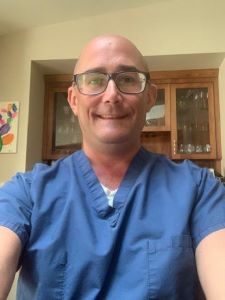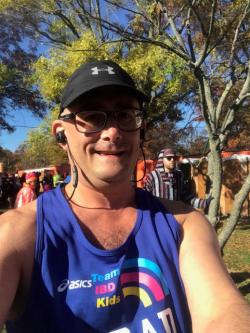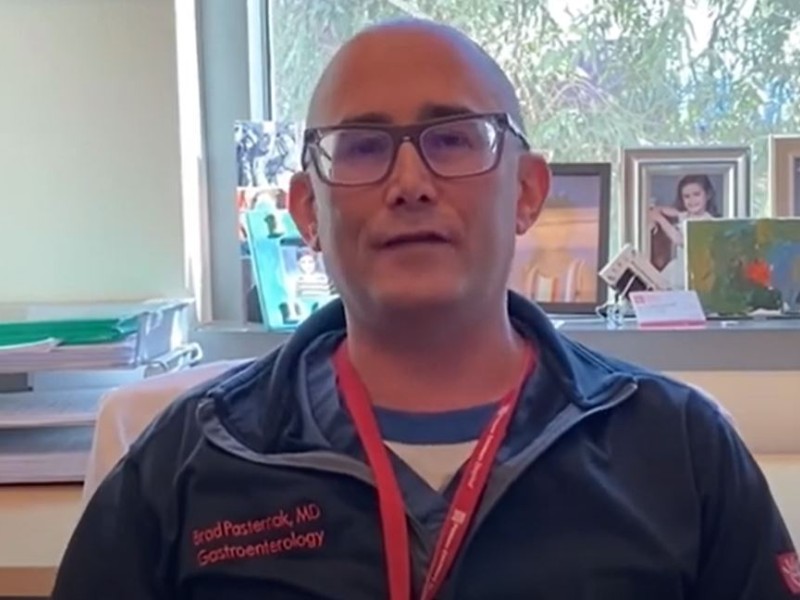Dr. Brad Pasternak is an inflammatory bowel disease (IBD) specialist and a co-medical director of the IBD program at Phoenix Children’s Hospital. Many know of his passion for IBD and dedication to serving the pediatric population; however, few may know of his personal connection to IBD.

Dr. Pasternak was diagnosed with ulcerative colitis, a type of inflammatory bowel disease, while studying in college. He ultimately used his personal experiences, love of science and passion for serving his community to become a pediatric gastroenterologist and care for children with IBD. Dr. Pasternak shares his journey from patient to provider below:
Most of you know me as Dr. Pasternak, or Dr. P, and many of you know I also suffer from IBD. For those who don’t, I want to share my story.
As a child, I had significant asthma that led my allergists to believe I wouldn’t be able to thrive in athletics due to breathing difficulty. Despite that, I always persevered. I was an avid athlete in high school, playing tennis, soccer and swimming and I continued to swim competitively in college. During my junior year, I started having symptoms of colitis. I was having bloody bowel movements, urgency, nocturnal symptoms and was stooling 25-30 times a day. I would have to sit in the last row of the lecture hall to be near the restroom. I would have to jump out of the pool to run to the locker room during practice. My naïve and uneducated self, at the time, tossed it up to college food, antics and stress. After two months of worsening symptoms, I finally admitted defeat and admitted that something was wrong.
I was ultimately diagnosed with ulcerative colitis. I was immediately placed on corticosteroids. This, in turn, resulted in bounding energy, sleepless nights and a ravenous appetite. I even had to purchase a small refrigerator for my room to quell my hunger! I did find myself using this extra energy and decreased sleep to study more and excel academically in college (always finding the silver lining).
I was always interested in science as a child. I had a math/science mind in addition to an altruistic soul. Medicine was the perfect career for me. I also loved working with children - I was a swim instructor, lifeguard, camp counselor and babysitter throughout my teenage years. There was no doubt I would be interested in pediatrics. Once I received my diagnosis of ulcerative colitis, I immediately became involved in the community. I joined the Crohn’s and Colitis Foundation and got a chance to mentor newly diagnosed patients, be involved in philanthropy events and ultimately work as a medical provider and counselor at Camp Oasis. Being diagnosed with this disease made me more curious than upset. I used this desire for knowledge and curiosity to drive my interest in pediatric gastroenterology, and IBD, in particular.

During my residency at Downstate Medical Center in Brooklyn, I was able to work with Dr. Barry Wershil, now chief of pediatric gastroenterology at Lurie Children’s Hospital in Chicago. I worked in his lab on immunology of some inflammatory gastrointestinal conditions. This collaboration ultimately led to my next chapter as a pediatric gastroenterology fellow at Cincinnati Children’s Medical Center. There, I started working in the molecular immunology laboratory of Dr. Christopher Karp (now at the Bill and Melinda Gates Foundation) studying the pathophysiology of inflammatory bowel disease. I worked closely with the IBD team at Cincinnati, specifically Dr. Ted Denson. I recognized my desire was to work with children and not mice, which led to my current position at Phoenix Children's Hospital, where I have been for the past 12 years.
Throughout my battle with ulcerative colitis, I have never let the disease define me in a negative manner. I have utilized it to quench my thirst for knowledge, love of science and immunology, desire to help people and to persevere. I have overcome flares during difficult times, recognizing that it is just a part of the disease and living with it. I have remained active and athletic. In fact, I have transformed into a runner and I remember a few years back training for a marathon and starting to flare. My first thought was, “Wow, I will really run this race fast if I have urgency for 26 miles.” My second thought was to try to determine how to train while flaring and how to succeed. On prednisone again, up all night, I did what we tell all our patients NOT to do and searched the internet. I made some discoveries about nutrition and IBD and adjusted my diet and lifestyle. Interestingly, the flare subsided, and I successfully completed the marathon with a personal best. That said, I have learned the importance of science and understanding the need for medication, balanced with a healthy lifestyle.
I still enjoy remaining active - both physically and academically. I am grateful for my personal connection to the disease which I have spent my career dedicated to treat and manage. I bring this personal connection to the IBD program here at Phoenix Children's Hospital and recognize the role my physicians have played in my life - as mentors, healers and coaches. As the co-medical director of the IBD program at Phoenix Children's Hospital, I am fortunate to work with a dedicated team who share the same passion for our patients and this disease process as I do.

To learn more about IBD and our IBD clinic at Phoenix Children’s, take a look at this video featuring Dr. Pasternak.
